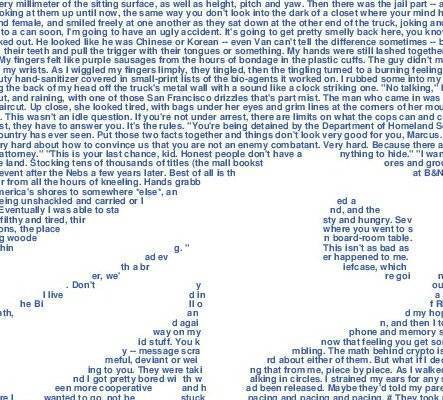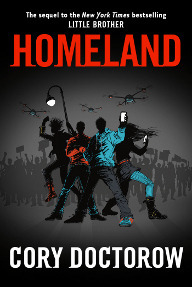Cory Doctorow's Blog, page 73
March 11, 2014
Snowden at SXSW: immediate impressions

Yesterday at SXSW, Barton Gellman and I did a one-hour introductory Q&A before Edward Snowden's appearance. Right after Snowden and his colleagues from the ACLU wrapped up, I sat down and wrote up their event for The Guardian, who've just posted my impressions:
Snowden described the unique recklessness of an American intelligence agency undermining internet security. “Our country’s economic success is based on our intellectual property – our ability to create, share, communicate and compete. S...
March 3, 2014
Podcast: Cold Equations and Moral Hazard
Here's a reading (MP3) of my latest Locus column, Cold Equations and Moral Hazard which considers the way that science fiction can manipulate our ideas about the technical necessity for human misery, and how that narrative can be hijacked for self-serving ends.
Apparently, editor John W. Campbell sent back three rewrites in which the pilot figured out how to save the girl. He was adamant that the universe must punish the girl.
The universe wasn’t punishing the girl, though. Godwin was – and so...
March 2, 2014
Cold Equations and Moral Hazard: science fiction considered harmful to the future

My latest Locus column is "Cold Equations and Moral Hazard", an essay about the way that our narratives about the future can pave the way for bad people to create, and benefit from, disasters. "If being in a lifeboat gives you the power to make everyone else shut the hell up and listen (or else), then wouldn’t it be awfully convenient if our ship were to go down?"
Apparently, editor John W. Campbell sent back three rewrites in which the pilot figured out how to save the girl. He was adamant th...
February 26, 2014
Guest review: my daughter reviews Ariol
I love reading with my daughter, Poesy, who has just turned six. We agree on almost all of her favorites, and re-reading them is one of our best-loved activities, and how we pass the time on boring bus-rides and so forth. However, there are a few books that Poesy loves, but which leave me cold. First among these is are the Ariol books, a long-running French kids' comic series that are being swiftly translated into English by Papercutz (there are three books out so far, and a fourth is due in...
February 23, 2014
Text of Little Brother on an art-litho, tee, or tote


As you may have noticed, I think Litographs are really cool: the company turns the text of various books into a piece of appropriately themed text-art and makes lithographs, tees and tote-bags out of it.
Now, I'm delighted to announce that the company has produced a line of Litographs based on my novel Little Brother, with a gorgeous anti-surveillance design by Benjy Brooke.

The Little Brother Litograph is available as a poster in three sizes, a tee (bearing the first 75,000 words of the book...
February 20, 2014
Museums and the free world: keynote from the Museums and the Web conference in Florence

Yesterday, I delivered a keynote address for the 2014 Museums and the Web Conference in Florence, speaking in the audience chamber of the Palazzo Vecchio, which is pretty much the definition of working the big room at the palace. The organizers will be uploading video shortly, but in the meantime, they've been kind enough to post the crib for my talk, which is pretty extensive. The talk was called "GLAM (galleries, museums, archives and libraries) and the Free World":
* The information age is,...
February 5, 2014
Why DRM is the root of all evil
Why DRM is the root of all evil
In my latest Guardian column, What happens with digital rights management in the real world?, I explain why the most important fact about DRM is how it relates to security and disclosure, and not how it relates to fair use and copyright. Most importantly, I propose a shortcut through DRM reform, through a carefully designed legal test-case.
The DMCA is a long and complex instrument, but what I'm talking about here is section 1201: the notorious "anti-circumventio...
February 3, 2014
Podcast: What does David Cameron’s Great Firewall look like?
Here's a reading of a recent Guardian column, What does David Cameron's Great Firewall look like? which debunks the UK government's stupid arguments for its national anti-porn firewall:
David Cameron's attempt to create a Made-in-Britain version of Iran's "Halal Internet" is the worst of both worlds for parents like me. Kids are prevented from seeing things that they need to access – sites about sexual health, for example – and I still have to monitor my daughter all the time when she uses the...
February 1, 2014
Locus recommended reading list for best science fiction and fantasy of 2013

Locus Magazine has published its annual Recommended Reading list, which is my favorite annual guide to the best that science fiction and fantasy have to offer. The 2013 roundup includes several of the books I've reviewed on Boing Boing this year, including Paolo Bacigalupi's Zombie Baseball Beatdown, Charlie Stross's Neptune's Brood, Lauren Beukes's The Shining Girls, Richard Kadrey's Dead Set, Terry Pratchett's Raising Steam, Ian Tregillis's Necessary Evil, Holly Black's The Coldest Girl in...
January 27, 2014
Podcast: Cheap writing tricks
Here's a reading of my latest Locus column, Cheap Writing Tricks, which discusses the mysterious business of why stories are satisfying, and how to make them so:
Plots are funny things. In the real world, stuff is always happening, but it’s not a plot. People live. People die. People are made glorious or miserable. Things eagerly awaited are realized, or hopes are cruelly dashed. Love is gained; love is lost. But all these things are not a plot – they lack the fundamental tidiness and orderlin...



